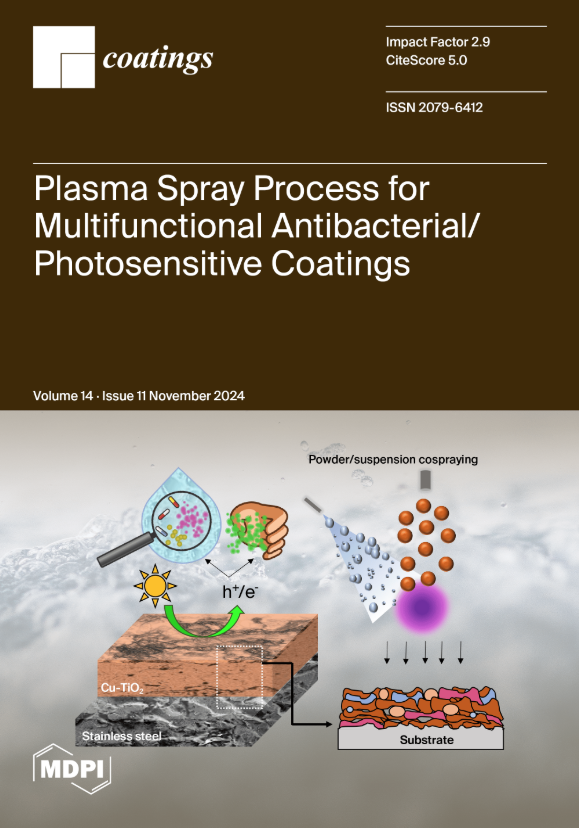Corrosion Resistance and In Vitro Biological Properties of TiO2 on MAO-Coated AZ31 Magnesium Alloy via ALD
IF 2.8
3区 材料科学
Q2 MATERIALS SCIENCE, COATINGS & FILMS
引用次数: 0
Abstract
The surface corrosion of magnesium alloys is effectively addressed currently by the creation of a micro-arc oxidation (MAO) ceramic layer. However, oxide film porousness restricts magnesium alloy use. Thus, this work used atomic layer deposition (ALD) to create a TiO2 coating on MAO-coated AZ31B magnesium alloy to plug micropores and increase corrosion resistance and biological characteristics. The samples were analyzed using SEM, EDS, XPS, and XRD to determine their surface appearance, chemical content, and microstructure. Micro-arc oxidation produced a 20 μm oxide coating. The TiO2 film reached 47.41 nm after 400 atomic layer deposition cycles. All corroded samples were tested for corrosion resistance using electrochemical and hydrogen evolution methods and examined for surface morphology. In vitro cell experiments examined biocompatibility. The results indicate that the TiO2 layer sealed the MAO coating’s micro-pores and micro-cracks, enhanced corrosion resistance, and preserved surface morphology following corrosion. The TiO2/MAO composite coating is more biocompatible than the substrate and MAO coating. This research proposes coating AZ31B magnesium alloy for bio-remediation to increase corrosion resistance and biocompatibility.通过 ALD 在 MAO 涂层 AZ31 镁合金上镀 TiO2 的耐腐蚀性和体外生物特性
目前,通过创建微弧氧化(MAO)陶瓷层可以有效解决镁合金的表面腐蚀问题。然而,氧化膜的多孔性限制了镁合金的使用。因此,本研究利用原子层沉积(ALD)技术在 MAO 涂层 AZ31B 镁合金上形成 TiO2 涂层,以堵塞微孔,提高耐腐蚀性和生物特性。样品通过 SEM、EDS、XPS 和 XRD 进行分析,以确定其表面外观、化学成分和微观结构。微弧氧化产生了 20 μm 的氧化物涂层。经过 400 次原子层沉积循环后,TiO2 膜达到 47.41 nm。使用电化学和氢进化方法测试了所有腐蚀样品的耐腐蚀性,并检查了表面形态。体外细胞实验检验了生物相容性。结果表明,TiO2 层封闭了 MAO 涂层的微孔和微裂缝,增强了耐腐蚀性,并在腐蚀后保持了表面形态。与基底和 MAO 涂层相比,TiO2/MAO 复合涂层的生物相容性更好。本研究建议对 AZ31B 镁合金进行生物修复涂层处理,以提高其耐腐蚀性和生物相容性。
本文章由计算机程序翻译,如有差异,请以英文原文为准。
求助全文
约1分钟内获得全文
求助全文
来源期刊

Coatings
Materials Science-Surfaces, Coatings and Films
CiteScore
5.00
自引率
11.80%
发文量
1657
审稿时长
1.4 months
期刊介绍:
Coatings is an international, peer-reviewed open access journal of coatings and surface engineering. It publishes reviews, research articles, communications and technical notes. Our aim is to encourage scientists to publish their experimental and theoretical results in as much detail as possible. There is no restriction on the length of the papers. Full experimental and/or methodical details must be provided. There are, in addition, unique features of this journal:
* manuscripts regarding research proposals and research ideas will be particularly welcomed
* electronic files or software regarding the full details of the calculation and experimental procedure - if unable to be published in a normal way - can be deposited as supplementary material
 求助内容:
求助内容: 应助结果提醒方式:
应助结果提醒方式:


